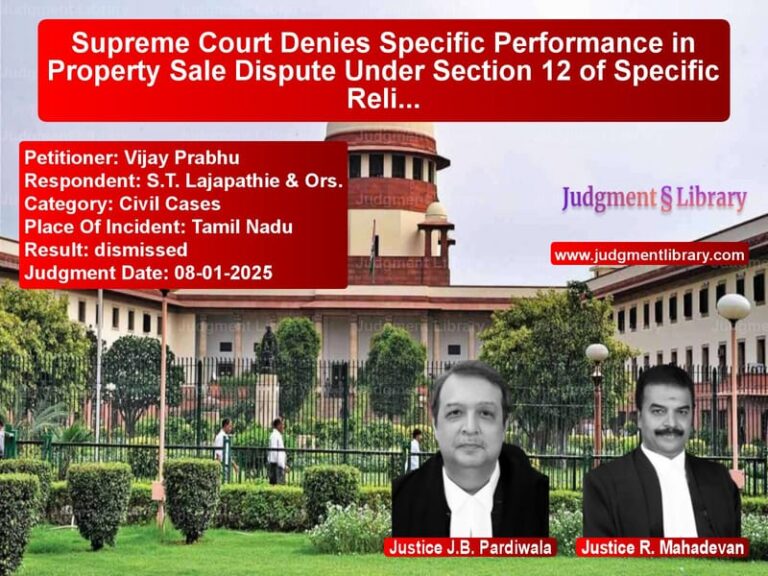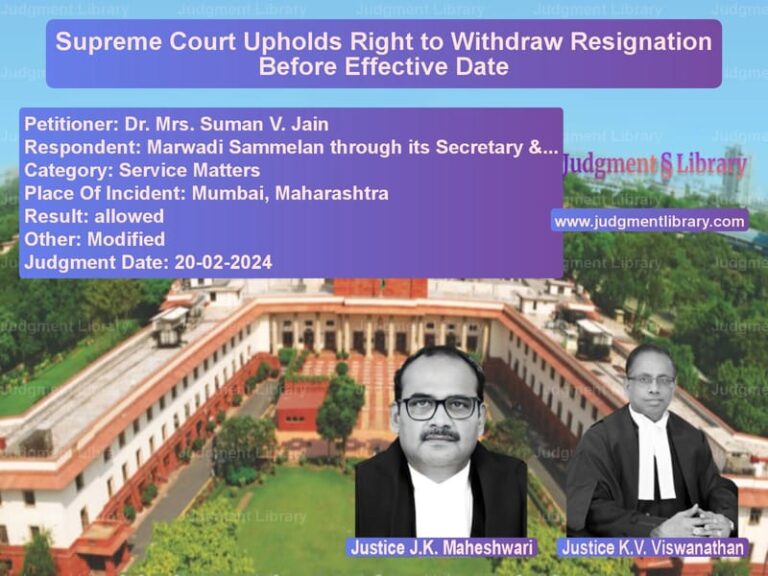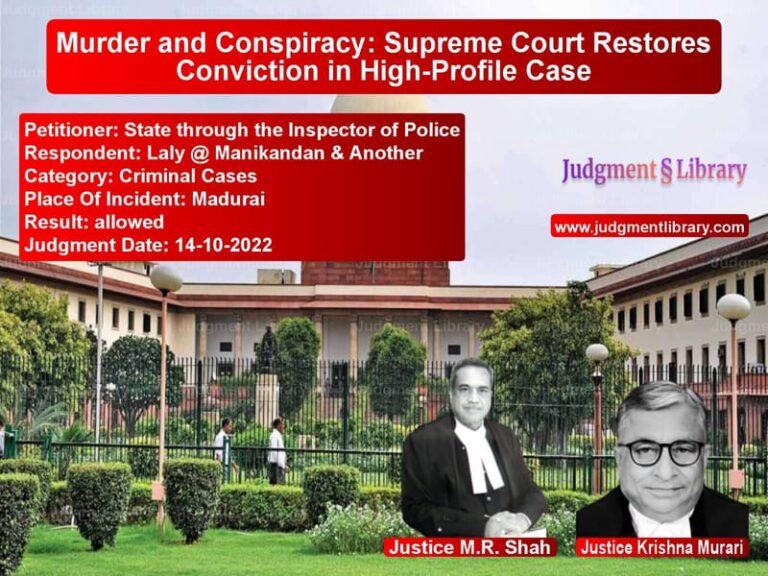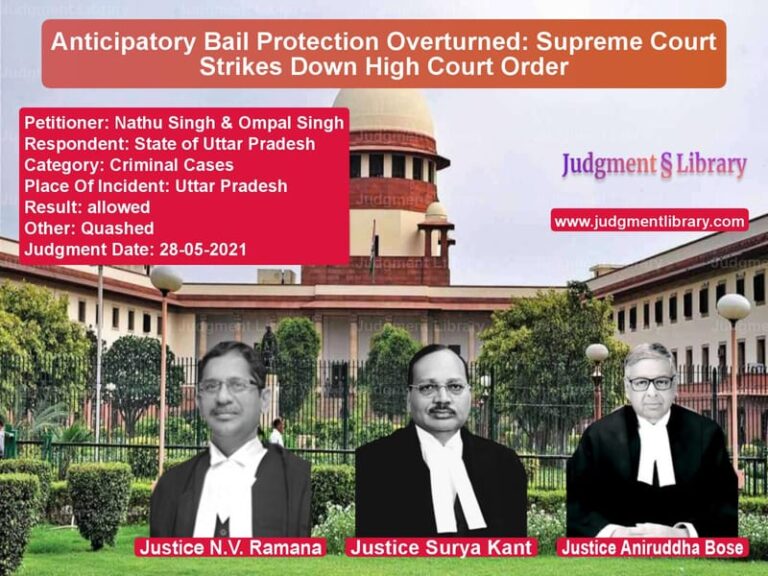Legal Distinction Between Murder and Culpable Homicide: Supreme Court Modifies Conviction in Pardeshiram Case
The case of Pardeshiram v. State of Madhya Pradesh (Now Chhattisgarh) revolves around the fundamental legal distinction between murder and culpable homicide not amounting to murder. The Supreme Court was tasked with determining whether the appellant’s actions fell under Section 302 IPC (murder) or Section 304-I IPC (culpable homicide not amounting to murder). This case serves as a significant precedent in understanding how courts interpret sudden fights and the absence of premeditation in violent acts.
The appeal arose from an incident that took place on May 30, 2002, in Village Bhardao Para, District Raipur, Chhattisgarh. The dispute was between two family members over the construction of a boundary wall on agricultural land. The argument escalated, leading to a violent altercation where the appellant struck the deceased with a shovel and later hit him with a stone, resulting in his death. The appellant was convicted under Section 302 IPC by the Trial Court, and the High Court upheld the conviction. The appellant then appealed to the Supreme Court, arguing that his actions were not premeditated and fell under Exception 4 of Section 300 IPC, warranting a conviction under Section 304-I IPC instead.
Case Background
The case originated from a long-standing land dispute between the accused, Pardeshiram, and the deceased, Kartik Ram. Both were related, and their disagreement over constructing a boundary wall had caused tensions between them. On the day of the incident, Kartik Ram was returning home after delivering fertilizer on his bullock cart when the appellant confronted him over the wall issue. A quarrel ensued, which was initially resolved by a third party, but after the mediator left, the altercation resumed. The appellant then climbed onto the bullock cart, struck the deceased with a shovel, and subsequently picked up a stone from the ground and hit him on the head. Kartik Ram succumbed to his injuries.
Trial Court Conviction
The prosecution’s case relied on eyewitness testimonies, medical reports, and the statement of the deceased’s son, Arjun (PW-1), who provided a detailed account of the incident. Other key witnesses included:
- Sukhbati Bai (PW-2), the wife of the deceased, who corroborated the sequence of events.
- Budhram (PW-3), who was declared hostile and did not support the prosecution.
- Shankar Lal (PW-4), the nephew of both the accused and the deceased, who also turned hostile.
- Dr. G.P. Chandrakar (PW-5), who conducted the postmortem and confirmed that the cause of death was a head injury.
- Netan (PW-6), the investigating officer, who provided additional evidence on the sequence of events.
Based on this evidence, the Trial Court convicted the appellant under Section 302 IPC and sentenced him to life imprisonment.
Arguments by the Petitioner
The appellant, through his counsel, challenged the conviction on the following grounds:
- The incident occurred due to a sudden quarrel without any premeditation.
- The accused did not plan to kill the deceased but reacted in the heat of passion.
- The appellant used a shovel, a common agricultural tool, rather than a weapon intended for murder.
- The second injury was caused by a stone picked up from the street, indicating a lack of prior intent.
- The act fell under Exception 4 of Section 300 IPC, making it culpable homicide not amounting to murder.
Arguments by the Respondent
The State of Chhattisgarh, representing the prosecution, countered with the following arguments:
- The accused had an ongoing land dispute with the deceased, indicating motive.
- The act of striking the victim with a shovel and then using a stone showed clear intent to cause serious harm.
- The injuries inflicted were sufficient in the ordinary course of nature to cause death, satisfying the requirements of Section 302 IPC.
- The Trial Court and High Court had already analyzed the evidence and correctly convicted the appellant.
Supreme Court’s Analysis
The Supreme Court examined whether the incident met the criteria for murder under Section 300 IPC or fell under the exceptions allowing for a lesser conviction under Section 304-I IPC.
Exception 4 of Section 300 IPC states:
“Culpable homicide is not murder if it is committed without premeditation in a sudden fight in the heat of passion upon a sudden quarrel and without the offender having taken undue advantage or acted in a cruel or unusual manner.”
Applying this principle, the Court noted:
- The altercation arose suddenly over a family dispute.
- The accused did not carry a weapon but used a common tool.
- The act was done in the heat of passion, not with premeditated intent.
- There was no element of cruelty or excessive force.
Given these findings, the Court ruled that the case fell under Exception 4 of Section 300 IPC and modified the conviction accordingly.
Final Judgment
The Supreme Court modified the conviction from Section 302 IPC to Section 304-I IPC and sentenced the appellant to the period already undergone—18 years. The Court ordered that he be released immediately if not required in any other case.
Legal Significance
This judgment reinforces the need to carefully assess the intent behind an act before determining the applicable legal provision. It highlights the distinction between premeditated murder and culpable homicide arising from a sudden altercation. The ruling serves as an important precedent for similar cases where an accused acts in the heat of passion without prior intent to kill.
Read also: https://judgmentlibrary.com/acquittal-in-bribery-case-n-vijayakumar-vs-state-of-tamil-nadu/
By modifying the conviction, the Court balanced the principles of justice by ensuring that the punishment was proportionate to the crime, taking into account the circumstances leading to the incident and the nature of the attack.
Petitioner Name: Pardeshiram.Respondent Name: State of Madhya Pradesh (Now Chhattisgarh).Judgment By: Justice Hemant Gupta, Justice S. Ravindra Bhat.Place Of Incident: Village Bhardao Para, District Raipur, Chhattisgarh.Judgment Date: 09-02-2021.
Don’t miss out on the full details! Download the complete judgment in PDF format below and gain valuable insights instantly!
Download Judgment: pardeshiram-vs-state-of-madhya-prad-supreme-court-of-india-judgment-dated-09-02-2021.pdf
Directly Download Judgment: Directly download this Judgment
See all petitions in Murder Cases
See all petitions in Bail and Anticipatory Bail
See all petitions in Judgment by Hemant Gupta
See all petitions in Judgment by S Ravindra Bhat
See all petitions in partially allowed
See all petitions in Modified
See all petitions in supreme court of India judgments February 2021
See all petitions in 2021 judgments
See all posts in Criminal Cases Category
See all allowed petitions in Criminal Cases Category
See all Dismissed petitions in Criminal Cases Category
See all partially allowed petitions in Criminal Cases Category







